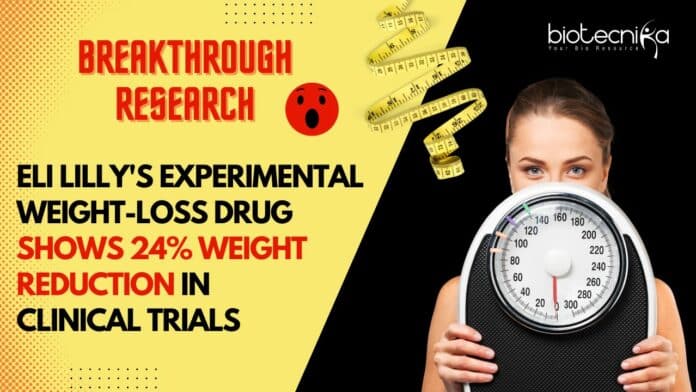Eli Lilly’s Obesity – Weight-Loss Drug Shows 24% Weight Reduction in Clinical Trials
Eli Lilly has announced promising results for its experimental weight-loss drug, retatrutide, following a Phase II study. Over the course of approximately one year of treatment, obese patients participating in the study achieved a remarkable 24% reduction in body weight. The highest dosage of retatrutide led to an average weight loss of 58 pounds among the patients, surpassing the effectiveness of other weight-loss drugs currently in development or already available in the market.
The significant findings were presented at the American Diabetes Association conference held in San Diego and published in the New England Journal of Medicine. Ania Jastreboff, the lead author of the study and director of the Yale Obesity Research Center, expressed her astonishment at the results, stating that participants on the highest dosage of retatrutide experienced a nearly one-quarter decrease in their body weight.
Retatrutide belongs to the next generation of weight-loss drugs, signifying advancements in this rapidly evolving field. As pharmaceutical companies expand beyond the initial generation of treatments, the market for weight-loss drugs, as well as the race in research and development, is expected to witness significant fluctuations. This progression will likely
lead to a diverse landscape where doctors and patients base their choices on factors such as convenience, side effects, and potency.The results presented are from a subset of patients who received the highest dosage in the trial, which involved 338 individuals. The participants were administered either a placebo or doses of 1 mg, 4 mg, 8 mg, or 12 mg. Retatrutide effectively met the primary endpoint of the study, demonstrating that, after 24 weeks, patients on the two highest doses achieved a weight reduction of approximately 17% compared to a mere 1.6% reduction in the placebo group.
The drug operates as a GIP/GLP-1 glucagon receptor triagonist, activating receptors for three hormones: glucagon, GIP, and GLP-1. This sets it apart from other available drugs that solely activate GIP and/or GLP-1.
Leading up to the release of these findings, Lilly had hinted at the potential of this mechanism. Although the company expressed the highest confidence in tirzepatide, marketed as Mounjaro, during its first-quarter earnings call, it acknowledged that drugs like retatrutide, which incorporates glucagon, could offer greater benefits.
Compared to other weight-loss drugs, retatrutide demonstrated superior efficacy. In a Phase III trial, Novo Nordisk’s WeGovy resulted in a 15% weight loss after 68 weeks, while an oral version of the same drug achieved a 15.1% reduction in body weight at the highest dosage. Lilly’s Mounjaro exhibited a 15.7% weight loss after 72 weeks.
In terms of safety and tolerability, retatrutide appears to be on par with other GLP-1 drugs. Adverse events were reported in 70% of the participants in the placebo group, and between 73% and 94% across the different retatrutide dosage groups. Most adverse events were gastrointestinal in nature, such as nausea and vomiting, with the majority being mild to moderate during the dose escalation phase. Gastrointestinal adverse events accounted for any discontinuations, with 6% to 16% of patients across the dosage groups discontinuing the study due to adverse events. No patients discontinued the study while on the placebo.
Jastreboff of Yale University expects retatrutide to become a part of a comprehensive suite of treatment options, including both drug-based therapies and bariatric surgeries, as prescribed by physicians. She emphasized the need for a multifaceted approach rather than relying solely on a single medication or injection.
The study also investigated several other endpoints, revealing that all patients on the two highest doses experienced a weight reduction of 5% or more. Furthermore, 90% of patients on the highest dose achieved a weight loss of 10% or more, nearly 50% achieved a reduction of 25% or more, and 25% of patients experienced a decrease of 30% or more in body weight.
News: Eli Lilly’s Obesity Weight-Loss Drug Shows Promising Results



























